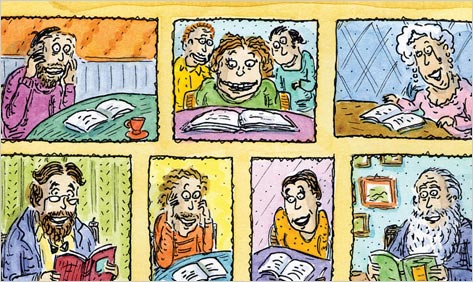The Possessed: Adventures with Russian Books and the People who Read Them

A delightful book about readers and writers, The Possessed begins with a question, “[H]ow does someone with no real academic aspirations end up spending seven years in suburban California studying the form of the Russian novel?” By way of answer, Elif Batuman has written a series of glittering essays, some previously published in Harper’s, The New Yorker, and The London Review of Books. Part travelogue, part literary criticism, and part bildungsroman about a scholar’s education, the resulting volume analyzes nineteenth-century Russian authors and Batuman’s fellow academics alike. It’s also very funny.
In college, Batuman focused on linguistics, in the hopes that understanding how language works would provide structural fodder for the novels she longed to write. But she feared that studying novels in too much detail would break their spell. Classes in beginning Russian correct this thinking, proving that “the riddle of human behavior and the nature of love appeared bound up with” the language itself. And so a reader is re-born, one who understands that close, careful, informed reading only heightens the power of texts.
To study the novel, Batuman argues, one must be possessed. As she works her way through her dissertation, she concludes that novels themselves spring from the writer’s own book-enraptured state: “[T]he novel form is ‘about’ the protagonist’s struggle to transform his arbitrary, fragmented, given experience into a narrative as meaningful as his favorite books.” But her book shows that you don’t have to be a fictional character to shape your life accordingly. The essays are an attempt at a populist literary criticism, a case study of real people — students, authors, professors, mostly — who advertently or not shape their lives around their favorite novels. Admittedly, it’s populism of and for an elite, self-selecting group. In the eponymous final essay, for example, she analyzes Dostoevsky’s Demons by finding analogies for its complex plot in her circle of grad school friends at Stanford, including the magnetic Matej. His fictional counterpart, Stavrogin, causes mass obsession and suicide; in real life, he causes relationships to break up, Batuman to fall into the sack, and mass confusion — at least within their intellectual hothouse world — when he departs Palo Alto to join a monastery in Europe.
Though this may sound like late-night grad-school conversations writ large, Batuman’s work never comes off as fatuous. When you love books, naturally you begin to imbue them with mysterious powers, assuming, for example, that you were meant to read them at the exact moment they turned up in your shopping cart or library shelf. And when you’re pursuing an advanced degree, naturally you begin to drop references to such things as Girard’s theory of mimetic desire. That said, there is a less forgivable strain of arrogance that occasionally manifests in these essays, as when Batuman compares her editors at The New Yorker to a crazy Russian empress who made her courtiers perform inanities for her amusement, or when socializing with fellow exchange students on the way to Tashkent, Uzbekistan, leads Batuman to lament “[h]aving extinguished two hours of my youth.”
But then the prose gets charming again. “Babel in California,” first published to many accolades in n + 1, describes Batuman’s experiences at an academic conference on Isaac Babel. The piece shows the absurdity of fetishizing an author’s objects or even relatives as a way of getting closer to a book. Invited to speak, Babel’s elderly daughter walks around shouting, “I AM CONFUSED” and “HE WAS MY PUPPY.” At another conference, on Tolstoy, fellow participants become convinced that Batuman’s attire of flip-flops and sweatpants is actually a statement on Tolstoyans, devoted, impoverished followers of the writer’s religious and political views (the less exalted truth: she had lost her luggage and had only her pajama-like traveling clothes to last through the weekend).
Of course, Batuman counts herself in the camp of the fetishizers, giddily describing her discovery of a propaganda poster Babel might have seen, which tenuously connects to a young American POW Babel encountered, an interview that in turn may have affected the making of King Kong. Her enthusiasm (and education) turn her into an obsessive, constantly questioning, probing for links or clues, however tenuous, that will allow a deeper understanding of how books work. At one point, she decides to argue that Tolstoy was murdered, despite the fact that he died, infirm, in his eighties, hoping that she’ll get a grant out of the process (she does, but for less than what she wanted). Later, she goes to Samarkand to spend a summer learning Uzbek; her fees include a $4,000 body bag, just in case.
“[O]ne . . . likes to think that literature has the power to render comprehensible different kinds of unhappiness. If it can’t do that,” she wonders, “what’s it good for?” Literary analysis, in Batuman’s hands, has other ends: to breeze past the boring bits (all those novels do take a while to get through, after all) and highlight only those moments when books cease to be paper and ink. In an era of worry about what’s to come, The Possessed reminds us of the multiple ways of enjoying a novel: finding its characters more real than even ourselves, understanding its plot in relation to the writer’s (or reader’s) life, unpacking its language for a sense of how a series of shapes convey such meaning, seeing the book as an animate object with its own past, future, and set of relationships. All we have to do is keep reading.
No doubt Batuman giggled when she heard this recent bit of publishing news: Quirk Books, publishers of the uber-successful Pride and Prejudice and Zombies, have decided on their next re-creation of a classic. Android Karenina will put Anna squarely in the world of steampunk and cyborgs; perhaps she’ll have better luck dealing with robots than love. I can’t wait to read what Batuman thinks.